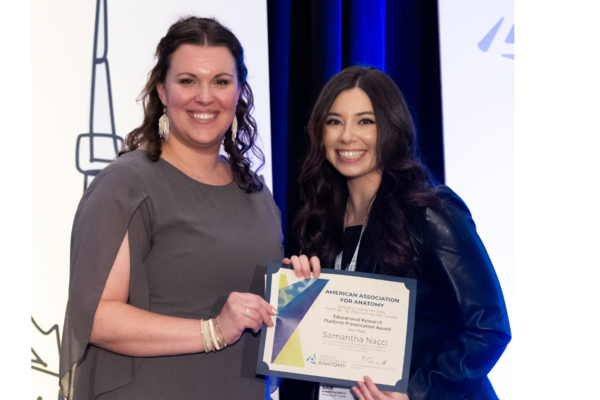Q&A with Monica Farag: Clinical Embryologist in training

The Department of Laboratory Medicine and Pathobiology at the University of Toronto, in partnership with the Department of Obstetrics and Gynecology, has launched a unique professional Masters program: the MHSc in Laboratory Medicine.
Designed to train highly qualified laboratory professionals in the fields of Pathologists’ Assistant (PA) and Clinical Embryology (CE), the two-year program accepted its first cohort of students in Fall 2020.
We speak to Monica Farag, in her second year of the Clinical Embryology field, about what it’s been like to be one of the first students in a pioneering program.
See also Q&A with Katie Ford: Pathologists’ Assistant in training
Why did you apply to be in the MHSc in Lab Medicine CE field?
After completing my undergrad in Human Biology and Psychology at U of T, I was searching for a field that could satisfy the three pillars I need in a career: impact, potential for growth and a research component. I heard about this program and was drawn to clinical embryology.
The joy you get from helping people finally achieve their dreams of becoming parents is beyond words. I love how dynamic and quickly evolving the field of assisted reproductive technology (ART) really is - I want to be an active contributor to these advances. I was also attracted to how it has a research component in addition to clinical training.
Even though I had just been accepted into a thesis-based master’s, I couldn’t pass up the opportunity to apply. The more research I did about the program and the field of assisted reproductive technology, the more confident I became that it would be a great fit.
You are the first cohort in a brand-new program – what’s that been like?
I was nervous at first, but it has actually been quite exciting – I feel like a pioneer helping to shape the program as we go along. We’re asked for frequent feedback and then the program team take it on board and adapt as much as they can.
For example, we have a course called ‘Current Topics in Causes and Treatment of Infertility’ taught by Dr. Miguel Russo, where we looked at what questions a patient would ask a clinical embryologist through role-playing. We found this so helpful, so the program team have created a workshop for next semester where we will further develop clinical and communication skills.
We see our feedback as not only benefiting us, but also future cohorts, and possibly future generations of clinical embryologists. The team is putting so much effort into the program – they are keen to make sure we have the tools we need to excel as future clinical embryologists.
You’re being trained in the practical aspects of being a CE, but also a large element of scientific research and rigor – how will that benefit your future career?
It's a necessity in the field of assisted reproductive technology as there are advances happening all the time. We need to be actively learning and critically evaluating novel treatments and technologies to ensure we are giving our patients the best care possible.
In our first year we learned about research methods, critical thinking, and statistics.
Now, in our second year, we’re putting our learning into practice through our Research Capstone Projects. The Capstone is such a wonderful opportunity to be able to work with professors and mentors that have contributed so much and have an incredible breadth of knowledge. To be able to learn from them one-to-one is a unique opportunity that I am very grateful to have.
What has your learning progression been like through the program?
We spent the first year building the background we need, giving us the scientific and theoretical knowledge. In the second year, we have been able to apply the research elements and get practical experience.
For example, we learned all about how an IVF lab is structured, what all the equipment is and why we use it in theory-based courses. When we were able to go into the physical lab space, we felt better equipped as we knew all the background before we touched anything.
This program is not just creating Clinical Embryologists, but also future Lab Directors. Learning the “why” behind current protocols helps us to think of areas we can advance in the future.
How have you been taught the practical aspects of the profession?
The Clinical Embryology Skills Development Laboratory (CESDL) has been created on campus specifically for this program. It’s been very exciting to get that hands-on experience, but we felt that more hands-on hours were needed to fine-tune and practice our technique. Thankfully, the program organizers mirrored our views and have added a tutorial for that purpose.
Being in a simulated environment is very beneficial. How well we handle people’s genetic material in the future may determine whether or not they will have a child. That is an immense amount of stress and having the practice and direct observation is key to doing it well when we graduate.
Dr. Scot Hamilton, the CE Skills Lab Director, allows us to make mistakes and learn how to correct them over and over until we get it. Having that opportunity allows for a very comfortable learning environment where we can gain the skills we need. We will then be able to build on these skills when we do rotations in real IVF labs later this year.
What has been the highlight for you so far?
Working with our mentors. It is an integral component in how the program has been structured. We are learning from experts in their field, not only researchers and clinicians but also practicing Clinical Embryologists and other laboratory professionals. They have been so open in teaching, giving advice, and sharing their experiences. It’s not only highly valuable from a learning perspective, but also for networking. Through the exposure the program has given me, I’ve gotten to meet and learn from some incredible experts in the field.



